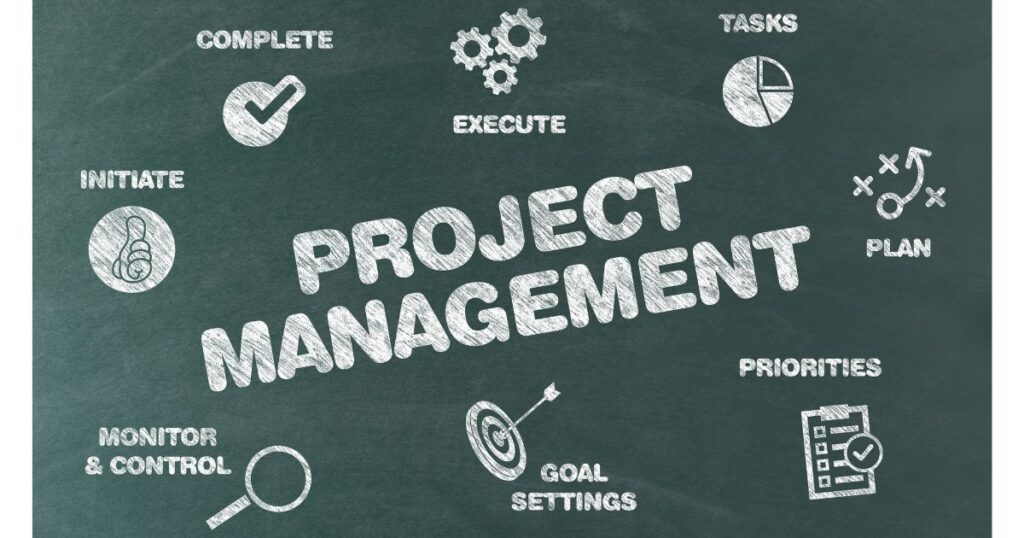Online Project Management Courses
A project management course is a training programme designed to equip individuals with the skills and knowledge necessary to successfully manage projects from start to finish.
Project management courses are becoming increasingly popular as organisations recognise the importance of effective project management in achieving their goals.
These courses cover various topics, including project planning, risk management, budgeting, and communication. The skills learned in a project management course can be applied to a wide range of industries, from construction and engineering to healthcare and IT.
In this article, we’ll discuss everything you need to know about an online project management course.
At Seven Learning, we offer a variety of online project management courses. Browse our courses, or contact our team to discuss your goals.
Key Highlights
- Project management is globally recognised and helps professionals complete projects efficiently.
- Project management courses provide the necessary knowledge, skills, and tools to meet project requirements and deliver projects within a specific time and budget.
- Obtaining a project management certification, such as Project Management Professional (PMP) certification, can greatly enhance your career prospects and earning potential.
- Project managers play a crucial role in overseeing projects, managing resources, and ensuring successful project completion.
- Different project management methodologies, such as agile, waterfall, and scrum, can be used depending on the project requirements and objectives.
- Choosing the right project management course is essential for gaining the necessary skills and knowledge to succeed in a project management career.
What is Project Management?
Project management is the process of planning, organising, and managing resources to achieve specific goals within a defined timeframe. It involves the application of knowledge, skills, tools, and techniques to meet project requirements.
The importance of project management lies in its ability to ensure that projects are completed on time, within budget, and to the required quality standards.
Effective project management also helps to minimise risks and maximise opportunities, while ensuring that stakeholders are kept informed and engaged throughout the project lifecycle.

What is a Project Management Course?
A project management course is designed to provide individuals with the knowledge and skills needed to effectively plan, execute, and oversee projects.
These courses typically cover topics such as project planning, scheduling, budgeting, risk management, team leadership, and communication.
Students learn various project management methodologies and best practices and often have the opportunity to work on real-world projects to apply their learning.
Course Objectives and Outcomes
Skills Development
A project management course is designed to equip individuals with the necessary skills and knowledge to effectively manage projects. The course covers a range of topics such as project planning, risk management, budgeting, scheduling, and communication.
By the end of the course, participants should be able to:
- Develop project plans that are realistic, achievable, and measurable
- Identify and manage project risks to ensure successful project delivery
- Create and manage project budgets to ensure that projects are delivered within budget constraints
- Develop and manage project schedules to ensure that projects are delivered on time
- Communicate effectively with stakeholders to ensure that project objectives are met
Career Advancement
A project management course can also help individuals advance their careers. The course provides participants with the knowledge and skills required to take on more challenging roles and responsibilities.
By completing a project management course, participants can:
- Demonstrate their commitment to professional development and continuous learning
- Enhance their CV and increase their chances of getting promoted
- Improve their job performance by applying project management principles and techniques to their work
- Network with other professionals in the field and gain valuable insights into industry best practices
Certification and Accreditation
Project management courses are not only designed to equip individuals with the knowledge and skills required to manage projects effectively, but they also provide a certification or accreditation upon completion. This certification or accreditation is a formal recognition that an individual has acquired the necessary knowledge and skills to manage projects successfully.
There are various types of project management certifications and accreditations available, such as PRINCE2, APM, PMP, and AgilePM. These certifications are recognised globally and are highly regarded by employers, as they demonstrate an individual’s commitment to their profession and their ability to manage projects effectively.
PRINCE2 (PRojects IN Controlled Environments) is a widely recognised project management certification in the UK and is used extensively by the UK government and private sector organisations. APM (Association for Project Management) is a professional body for project management in the UK and offers a range of certifications and accreditations for individuals at all levels of experience.
PMP (Project Management Professional) is a globally recognised certification offered by the Project Management Institute (PMI) and is designed for experienced project managers. AgilePM is an agile project management certification that focuses on delivering projects in an agile environment.
Related: What is PMP certification?
What Do You Learn in a Project Management Course Online?
In an online project management course, you can expect to learn a variety of essential skills and knowledge related to effectively managing projects.
Some of the key topics covered in such courses include project planning, scheduling, budgeting, risk management, quality control, team leadership, communication, and stakeholder management.
Additionally, you may learn about different project management methodologies such as Agile, Scrum, and Waterfall, as well as tools and software commonly used in project management.
Many online courses also provide practical exercises, case studies, and simulations to help students apply their learning in real-world scenarios.

Benefits of Taking a Project Management Course
Taking a project management course offers numerous benefits, including the opportunity to learn essential skills for effectively planning, organising, and executing projects.
It provides a solid understanding of project management methodologies, tools, and techniques, enhancing your ability to lead and manage projects with confidence.
Additionally, the course can improve communication, leadership, and problem-solving skills, leading to increased job opportunities and career advancement.
Moreover, it enables individuals to gain industry-recognised certifications, enhancing their credibility and earning potential in the field of project management.
Benefits of Taking a Project Management Course:
- Acquisition of essential project management skills
- Understanding of project management methodologies, tools, and techniques
- Improved leadership and communication abilities
- Enhanced problem-solving skills
- Increased job opportunities and career advancement
- Attainment of industry-recognised certifications
- Boost in credibility and earning potential in the project management field
What Skills Do You Need For a Project Management Career?
Effective project management requires a diverse set of skills, including:
1. Leadership: The ability to inspire and motivate team members, make decisions, and provide direction.
2. Communication: Strong verbal and written communication skills to convey information clearly and effectively to team members, stakeholders, and clients.
3. Time management: Efficiently managing time and prioritizing tasks to meet project deadlines.
4. Organization: Keeping track of project details, resources, and schedules to ensure smooth progress.
5. Problem-solving: The capacity to identify and address issues that arise during the project lifecycle.
6. Team management: Building and leading teams, resolving conflicts, and fostering collaboration.
7. Risk management: Assessing potential risks and developing strategies to mitigate them.
8. Budgeting and financial management: Understanding project finances and managing budgets effectively.
9. Adaptability: Being flexible and able to adjust to changing project requirements and unexpected challenges.
10. Technical skills: Familiarity with project management tools, software, and methodologies.
These skills, combined with knowledge of project management principles, contribute to successful project delivery.
Related: What Makes a Good Project Manager?
Career Paths in Project Management
Project management is a versatile field that offers a wide range of career opportunities. Here are some of the common career paths in project management:
Project Manager
Project managers are responsible for overseeing the planning, execution, and closing of projects. They ensure that projects are completed on time, within budget, and to the satisfaction of stakeholders. Project managers need to have strong leadership, communication, and problem-solving skills.
Programme Manager
Programme managers oversee multiple projects that are related to each other. They ensure that the projects are aligned with the organisation’s strategic goals and objectives. Programme managers need to have excellent organisational, communication, and leadership skills.
Portfolio Manager
Portfolio managers oversee multiple programmes and projects that are related to each other. They ensure that the programmes and projects are aligned with the organization’s strategic goals and objectives. Portfolio managers need to have strong analytical, strategic, and leadership skills.
Project Coordinator
Project coordinators support project managers in planning, executing, and closing projects. They ensure that project tasks are completed on time and within budget. Project coordinators need to have excellent organisational, communication, and problem-solving skills.
Project Scheduler
Project schedulers are responsible for creating and maintaining project schedules. They ensure that project tasks are completed on time and within budget. Project schedulers need to have strong analytical, communication, and problem-solving skills.
Agile Coach
Agile coaches help organisations adopt and implement agile methodologies. They provide guidance and support to teams in using agile practices and principles. Agile coaches need to have strong coaching, facilitation, and communication skills.
Why Should You Take a Project Management Training Course With Seven Learning?
Taking a project management training course with Seven Learning can offer numerous benefits. Seven Learning is known for its comprehensive and practical approach to project management education, providing valuable insights and skills that are directly applicable to real-world project scenarios.
The training courses offered by Seven Learning are designed and delivered by experienced professionals in the field, ensuring high-quality instruction and relevant industry knowledge.
Additionally, Seven Learning’s reputation for excellence in project management training can enhance the credibility of individuals who complete their courses, potentially leading to improved career prospects and job opportunities.
Furthermore, the practical tools and techniques taught by Seven Learning can empower individuals to effectively lead and manage projects, ultimately contributing to their professional success.

Enrolling in an Online Course With Seven Learning
Enrolling in an online course with Seven Learning presents an excellent opportunity to enhance your project management skills conveniently and effectively. With a diverse range of online project management courses tailored to meet various skill levels and professional needs, Seven Learning provides a flexible and accessible learning experience.
Whether you are looking to advance your career or broaden your expertise, Seven Learning’s online courses offer a convenient and comprehensive approach to professional development.
Take the first step toward mastering project management today.
Browse our online project management courses or contact our friendly team today to discover the ideal learning path for your goals.
Frequently Asked Questions
What qualifications are required to enrol in a project management course?
Most project management courses do not require any specific qualifications. However, some courses may require prior experience in project management or a related field. It is best to check the course requirements before enrolling.
What topics are typically covered in a project management course?
Project management courses cover a range of topics, including project planning, scheduling, budgeting, risk management, stakeholder management, and team management. Some courses may also cover specific project management methodologies, such as Agile or Waterfall.
How can project management certifications enhance my career prospects?
Project management certifications demonstrate to employers that you have the knowledge and skills required to manage projects effectively. They can enhance your career prospects by making you more competitive in the job market and increasing your earning potential.
What are the differences between various project management methodologies?
Different project management methodologies have different approaches to project planning, execution, and delivery. For example, Agile methodologies focus on flexibility and adaptability, while Waterfall methodologies follow a more structured approach. It is important to understand the differences between various methodologies to determine which approach is best suited for your project.
Can beginners with no prior experience benefit from project management courses?
Yes, beginners with no prior experience can benefit from project management courses. These courses provide a comprehensive introduction to project management principles and practices and can help beginners develop the skills and knowledge required to manage projects effectively.
What practical skills can I expect to gain from a project management course?
Project management courses provide practical skills such as project planning, scheduling, budgeting, risk management, stakeholder management, and team management. These skills are essential for managing projects effectively and can be applied to a range of industries and sectors.



